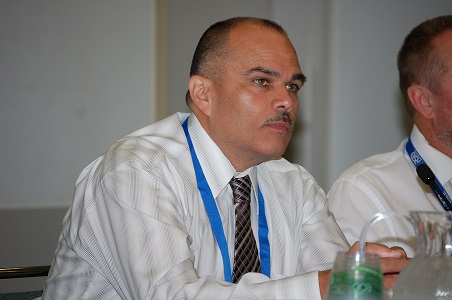Discussion within the industry of “alt-OE” or “opt-OE” parts seemingly has raised more questions than answers this past year, but one state regulatory agency has a clear stand on the topic – one that may drive changes nationwide.
“The term by itself, ‘alt-OE’ or ‘opt-OE,’ is not recognized by the Bureau,” Jaime Ramos of the California Bureau of Automotive Repair (BAR) field operations and enforcement division told attendees at NACE in Anaheim, Calif., in August.
Ramos and other representatives of the BAR said that it’s clear from discussion with shops that a wide variety of types of parts are being lumped together under the “alt-OE” or “opt-OE” category names in some markets.
Some of those parts appear to be new OEM parts but are being sold and delivered by non-OEM or salvage parts suppliers, shops say. Others appear to be slightly-damaged or blemished OEM parts that may or may not arrive “repaired.”
Given that shops don’t always know what they will receive when they order such a part, the BAR said, consumers certainly won’t know what those term mean on an repair estimate or invoice. Shops in that state are free to use such parts, Ramos said, but they can’t use those terms on the paperwork without more adequately explaining what is being put on the vehicle.
“The BAR has no position on whether they are good or bad parts,” he said. “But the whole premise of [BAR requirements] is that parts are described in a manner the customer understands. So you need to find a way to explain it so the customer understands exactly what they’re getting. I would go so far as explaining: Are they getting the same warranty? Is it the same type of part? Is it a blemished part?”
A shop owner at the meeting told Ramos that at least some of the parts appear to be OEM, arriving in OEM packaging even if sold by a recycler or non-OEM parts vendor. In such instances, the shop owner asked, should they be listed on the estimate as OEM?
“It’s hard for us to say exactly how to classify it,” Ramos responded. “You as a shop owner will have to decide what it is.”
But another shop owner pointed out that several automakers, including Toyota and General Motors at a meeting held in conjunction with NACE, have said they have no programs to sell OEM parts outside of their dealer network, and that only parts purchased through their dealers are “OEM.”
“I think Toyota and GM just did you a favor, by telling you [that ‘alt-OE’ or ‘opt-OE’] is not OEM,” Ramos told shops at the presentation.
Representatives of Honda and Mercedes-Benz earlier this year similarly said they have no involvement in the “alt-OE” or opt-OE” parts category.
Ramos said he doesn’t anticipate the BAR will add those categories to its list of accepted parts terminology, given the ambiguity even within the industry about what such parts are. But neither, he said, is the BAR likely to put something in writing showing that those terms are not a recognized part category. Ramos said it’s just easier to list the acceptable terminology than to try to list all the potential unaccepted terms.
Jack Molodanof, a lobbyist who represents the California Autobody Association (CAA), said the state’s insurance commissioner’s office is looking into the issue as well, but has not yet taken a position.
Jack Molodanof
“If they do take a position similar to BAR, they are going to tell insurance companies to stop it,” in terms of pushing for the use of alt-OE or opt-OE parts, Molodanof said. “But they’re not there yet.”
In the meantime, he cautioned shops, stay in compliance with BAR regulations.
“If the insurance company is telling you to do something, and you’re doing it and it violates BAR, the insurance companies are not going to be there for you, because the BAR doesn’t care about the insurers,” he said. “They care about you, and it’s your license that is at risk.”
A number of industry leaders have said that if there’s pressure from shops and regulators in California on parts suppliers and the information providers to better define “alt-OE” or opt-OE” parts in that state, that may lead to some changes nationwide.
John Yoswick, a freelance writer based in Portland, Oregon, who has been writing about the automotive industry since 1988, is also the editor of the weekly CRASH Network (for a free 4-week trial subscription, visit www.CrashNetwork.com). He can be contacted by email at jyoswick@SpiritOne.com.











John Yoswick